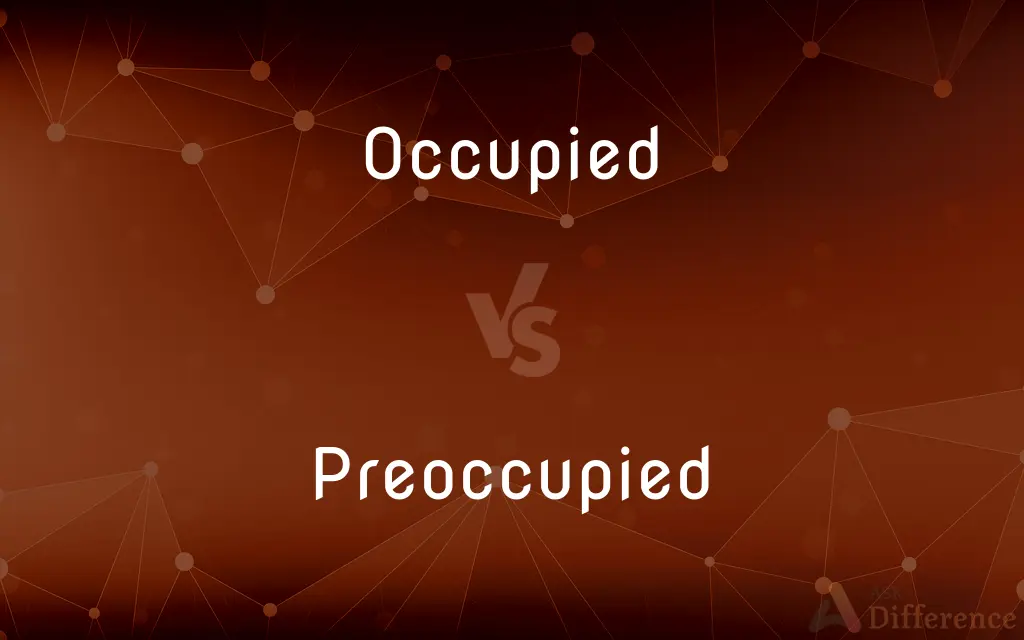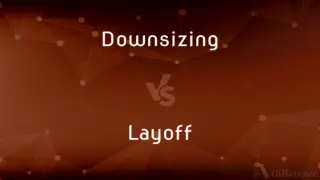Occupied vs. Preoccupied — What's the Difference?
Edited by Tayyaba Rehman — By Maham Liaqat — Updated on March 7, 2024
Occupied means being busy or engaged with an activity, while preoccupied refers to being absorbed in thought, often to the extent of being unaware of one's surroundings.

Difference Between Occupied and Preoccupied
Table of Contents
ADVERTISEMENT
Key Differences
Being occupied involves dedicating time and attention to a specific task or activity, such as working on a project or attending a meeting. This state implies active engagement in a physical or mental activity. Preoccupied, on the other hand, suggests that one's mind is engrossed in thoughts or worries, which may not necessarily be related to the immediate task at hand, often leading to distraction from the present moment.
Occupied individuals are typically focused on completing the tasks before them, showing an outward display of engagement. Their attention is directed towards achieving a goal or fulfilling a responsibility. Whereas, someone who is preoccupied might be physically present in a situation but mentally distant, as their thoughts are consumed by other concerns or daydreams, impacting their ability to concentrate on current tasks.
The term "occupied" is often used in a more neutral or positive context, indicating productivity or engagement. For example, an occupied conference room is one in use, and an occupied person is busy with activities deemed productive or necessary. Conversely, being preoccupied is frequently viewed in a negative light, suggesting an inability to focus or be fully present, which can affect one's effectiveness or interpersonal interactions.
While "occupied" suggests a clear engagement with external tasks or activities, "preoccupied" delves into the internal, psychological state of an individual. This distinction is important in understanding the impact of these states on performance, relationships, and overall well-being. Someone might switch from being occupied to preoccupied throughout the day, depending on external pressures and internal responses to those pressures.
In terms of managing these states, strategies for staying effectively occupied include time management and setting clear goals, while addressing preoccupation might involve mindfulness practices or problem-solving approaches to manage worrying thoughts or distractions. Understanding and distinguishing between being occupied and preoccupied can help individuals better navigate their mental and physical engagements, improving productivity and mental health.
ADVERTISEMENT
Comparison Chart
Definition
Engaged in an activity or task.
Absorbed in thought, often to the point of distraction.
Focus
External tasks or activities.
Internal thoughts or concerns.
Perception
Often viewed positively, indicating productivity.
Can be seen negatively, suggesting distraction.
Impact
Implies active engagement and achievement.
May lead to decreased focus and effectiveness.
Management Strategies
Time management, setting clear goals.
Mindfulness, addressing underlying concerns.
Compare with Definitions
Occupied
Being in use, such as a facility or space.
The meeting room is occupied until 3 PM.
Preoccupied
Focused on a particular subject or idea to the detriment of others.
He was preoccupied with thoughts of what could go wrong.
Occupied
Busy with tasks or responsibilities.
He was too occupied with his studies to go out.
Preoccupied
Absorbed in thought, not paying attention to one’s surroundings.
She was so preoccupied with the problem that she missed her stop.
Occupied
Filled or taken up by a presence or activity.
Her schedule was occupied by back-to-back meetings.
Preoccupied
Distracted by personal concerns or worries.
He's been preoccupied with his health lately.
Occupied
Engaged in an activity or work.
The artist remained occupied with her painting for hours.
Preoccupied
Having one's mind dominated by something, making it difficult to concentrate.
With the wedding approaching, she was preoccupied with details.
Occupied
Controlled or inhabited by a military or political force.
The territory has been occupied by foreign troops.
Preoccupied
Thinking about something intensely, to the exclusion of other things.
The novelist was preoccupied with her latest plot twist.
Occupied
Occupied (Norwegian: Okkupert) is a Norwegian political thriller TV series that premiered on TV2 on 5 October 2015. Based on an original idea by Jo Nesbø, the series is co-created with Karianne Lund and Erik Skjoldbjærg.
Preoccupied
Engrossed in thought; distracted
She seemed a bit preoccupied
Occupied
(of a building, seat, etc.) being used by someone
Only the ground floor is fully occupied
Preoccupied
Absorbed in thought; engrossed.
Occupied
Busy and active
Tasks which kept her occupied for the day
Preoccupied
Excessively concerned with something; distracted.
Occupied
(of a place, especially a country) taken control of by military conquest or settlement
The occupied territories
Preoccupied
Formerly or already occupied.
Occupied
To fill up (time or space)
A lecture that occupied three hours.
Preoccupied
Already used and therefore unavailable for further use. Used of taxonomic names.
Occupied
To dwell or reside in (an apartment, for example).
Preoccupied
Concerned with something else; distracted; giving one's attention elsewhere.
I was preoccupied with a deadline at work, and I forgot his birthday.
Occupied
To hold or fill (an office or position).
Preoccupied
Describing a scientific name that was previously used, a junior homonym.
Occupied
To seize possession of and maintain control over forcibly or by conquest
The troops occupied the city.
Preoccupied
Simple past tense and past participle of preoccupy
Occupied
To engage or employ the attention or concentration of
Occupied the children with coloring books.
Preoccupied
Deeply absorbed in thought;
As distant and bemused as a professor listening to the prattling of his freshman class
Lost in thought
A preoccupied frown
Occupied
Reserved, engaged.
The stall on the left is occupied.
Preoccupied
Having or showing excessive or compulsive concern with something;
Became more and more haunted by the stupid riddle
Was absolutely obsessed with the girl
Got no help from his wife who was preoccupied with the children
He was taken up in worry for the old woman
Occupied
Busy, unavailable.
She is occupied at the moment.
Occupied
Subjugated, under the control of a foreign military presence.
My father travelled to occupied Japan in December 1945.
Occupied
Used to communicate that a toilet is unavailable.
Occupied
Simple past tense and past participle of occupy
Occupied
Engaged; in use; being used by a person and not free for use by someone else; as, the wc is occupied. Opposite of free, available, and unoccupied.
Occupied
Inhabited, lived-in, tenanted; having residents; - of dwelling units.
Occupied
Overrun, taken over; - of countries or territories; as, occupied France. Opposite of unoccupied.
Occupied
Busy; actively or fully engaged in some activity; - of people. Opposite of idle.
Occupied
Held or filled or in use;
She keeps her time well occupied
The wc is occupied
Occupied
Seized and controlled as by military invasion;
The occupied countries of Europe
Occupied
Resided in; having tenants;
Not all the occupied (or tenanted) apartments were well kept up
Occupied
Having ones attention or mind or energy engaged;
She keeps herself fully occupied with volunteer activities
Deeply engaged in conversation
Common Curiosities
What does it mean to be occupied with work?
Being occupied with work means actively engaging in job-related tasks or activities.
How can one manage being overly preoccupied?
Techniques include mindfulness meditation, prioritizing tasks, and seeking solutions to underlying worries or concerns.
How does being preoccupied with worries differ from anxiety?
Being preoccupied with worries is a state of mind focused on specific concerns, while anxiety is a broader, more persistent feeling of nervousness or unease.
What strategies help to stay occupied effectively?
Setting clear goals, breaking tasks into smaller steps, and minimizing distractions can help stay effectively occupied.
Can someone be occupied and preoccupied at the same time?
Yes, it's possible to be physically occupied with a task while mentally preoccupied with unrelated thoughts.
What are signs of being preoccupied?
Signs include forgetfulness, absent-mindedness, and a lack of awareness of one's surroundings.
How can being preoccupied affect one’s life?
Being preoccupied can lead to decreased productivity, missed opportunities, and strained relationships due to lack of attention and presence.
What impact does being preoccupied have on relationships?
It can strain relationships, as it may make individuals seem distant or uninterested in others.
Is it bad to always be occupied?
Constantly being occupied without rest can lead to burnout and stress, so balance is important.
Can preoccupation lead to creativity?
Yes, being preoccupied with certain thoughts or ideas can sometimes spark creativity and lead to innovative solutions.
How can being occupied benefit mental health?
Engaging in meaningful activities can provide a sense of purpose and accomplishment, benefiting mental health.
How can employers help employees who are preoccupied?
Employers can offer support through flexible work arrangements, access to counseling services, and a supportive work environment.
Why do people become preoccupied?
People may become preoccupied due to stress, unresolved issues, or significant life changes requiring a lot of thought.
How can one switch from being preoccupied to occupied?
By focusing on the present task, employing mindfulness techniques, and addressing the concerns that lead to preoccupation.
Is being occupied always related to work?
No, one can be occupied with any activity that requires attention, including hobbies or leisure activities.
Share Your Discovery

Previous Comparison
Sincere vs. Truthful
Next Comparison
Downsizing vs. LayoffAuthor Spotlight
Written by
Maham LiaqatEdited by
Tayyaba RehmanTayyaba Rehman is a distinguished writer, currently serving as a primary contributor to askdifference.com. As a researcher in semantics and etymology, Tayyaba's passion for the complexity of languages and their distinctions has found a perfect home on the platform. Tayyaba delves into the intricacies of language, distinguishing between commonly confused words and phrases, thereby providing clarity for readers worldwide.
















































